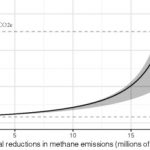Mainstream scenarios state the unavoidable need for continued use of fossils through to 2050. For the world to stay within its carbon budget, that means the unavoidable need for carbon capture and plugging “fugitive” leaks. Chris Bataille at the Center on Global Energy Policy flags up the danger that new CCS projects with seemingly impressive capture rates of up to 60% may nevertheless become commercially unviable as carbon prices rise: that … [Read more...]
Fulfilling the Global Methane Pledge: “polluter pays”, more electrification, less gas
At COP26 the U.S. and the EU led a global pledge to slash methane emission by 30% by 2030. Methane makes up at least one-quarter of all greenhouse gases, and is more than 80 times more damaging than CO2 over a 20-year period. Success in cutting these emissions would be a major step towards meeting our 1.5°C goals. But far from declining, 2020 saw methane emissions grow at the fastest rate in 40 years. The increased use of natural gas (mostly made … [Read more...]
Satellite monitoring of Methane leaks makes policing them more effective
Satellites, drones, and airplanes should be used to detect methane leaks across the million active wells and hundreds of thousands of miles of pipelines across the U.S. That’s because without proper monitoring it’s extremely hard to find leaks, let alone regulate them. Meredith Fowlie at UC Berkeley’s Energy Institute at Haas describes their paper that uses such data to, first, show that 2.3% of upstream natural gas production is leaking. That’s … [Read more...]




